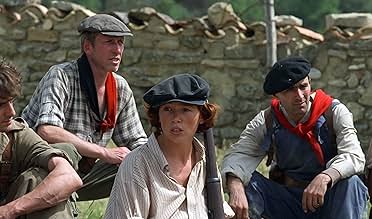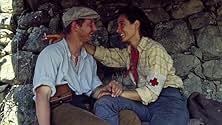Land and Freedom
- 1995
- Tous publics
- 1h 49m
David is an unemployed communist that comes to Spain in 1937 during the civil war to enroll the republicans and defend the democracy against the fascists. He makes friends between the soldie... Read allDavid is an unemployed communist that comes to Spain in 1937 during the civil war to enroll the republicans and defend the democracy against the fascists. He makes friends between the soldiers.David is an unemployed communist that comes to Spain in 1937 during the civil war to enroll the republicans and defend the democracy against the fascists. He makes friends between the soldiers.
- Nominated for 1 BAFTA Award
- 8 wins & 5 nominations total
- Maite
- (as Iciar Bollain)
- Juan Vidal
- (as Marc Martinez)
- Bernard Goujon
- (as Frederic Pierrot)
- Militia member
- (as Andres Aladren)
- Militia member
- (as Roca)
- Militia member
- (as Emili Samper)
- Director
- Writer
- All cast & crew
- Production, box office & more at IMDbPro
Featured reviews
The crimes of the Stalinists are portrayed throughout the film -- they deny decent, modern weapons to those sections of the front which they do not control; they actively engage in repression against the POUM and the anarchists in Barcelona; in the pages of the British Daily Worker which we briefly see on the screen, we are shown the daily barrage of lies they spread (such as Trotsky's 'support' for Franco fascism).
Anyone who sees this film as simply a black-and-white, good vs evil portrayal of heroic young people aiding the brave Spaniards in their battle for freedom is missing what is, I believe, its main point. It is not primarily about Spain.
Seeing a film like this, I cannot forget the more typical Hollywood portrayals (at least in the last generation) of Communists. A film like "The Way We Were" shows the American Communist Party only during those moments when its positions would today be considered palatable (supporting the Spanish republic, backing Roosevelt and the US war effort in World War II, and later calling for nuclear disarmament).
It doesn't show the time of the Moscow Trials, nor the real role played by the Soviet Union and its agents in Spain, nor the Communist Party's opposition to fighting Hitler and the Nazis in 1939-41, nor the post-war period when the Party did what it could to encourage nuclear proliferation by passing on atomic secrets to Stalin.
Land and Freedom does try to show one of the Comintern's uglier moments, to its credit.
A film like this was made possible by the fact that Loach comes out of the British far left, and the British far left has long been dominated not by Stalinists but by their Marxist opponents -- primarily the Trotskyists of the Socialist Workers Party (SWP). Whatever disagreements I or others may have with the SWP (and they are many), at least they rejected Stalinism.
What we need are more films like this showing the real role played by Communist Parties all during the history of the Soviet regime. For example a film set in any European country during the period between September 1939 and June 1941 (the time of the Hitler-Stalin pact) which honestly portrays Communist parties as allies of the Nazis (even in occupied countries like Norway and France) would be welcome.
Truthfully I could care less about the politics of this tragic episode in world history, BUT the director,by his sheer genius & craftsmanship made me sit at the edge of my seat & pay close attention. Subtitles are used sparingly & it is hard to make some of the dialogue out due thick accent, The acting is so skillfull you needed no dialogue,you are able to understand each actors feelings & emotions. Credit this to Mr.Loach, The only actor I have heard of in this film is the lead IAN HART/ He & all the others do an excellent job. This film was made in 1995, & barely released,another example of distributors not knowing a GREAT film from a hole in the ground. Even this is a war film, there is very little violence, a good history lesson for the younger ones, then a trip to the library to find out more.
My rating is ***1/2 95/100 points 9 on IMDb
In tackling the Spanish Civil War any writer is faced with the overwhelming complexities that underlie the events. The regionalism (think only of the Catalan and Basque regions, let alone Galicia and Andalusia), the monarchy, the Catholic Church, landowners, trade unions, anarchists plus the leaderships of the Nationalist and Republican movements all combined to create a very tangled web. Add to that outside involvement, principally from Mussolini and Stalin, the vacillation of Britain and France and, of course, the omnipresence of Hitler, and anyone might wonder where to start.
Loach and Allen take their approach through the eyes of an unemployed Liverpudlian, David Carr (admirably played by Ian Hart) who, as a card-carrying member of the Communist Party, answers the call to fight for the Republic. We follow his exploits through a number of episodes, involving battles, falling in love, injury and, ultimately, a degree of disillusion as the reality of Stalin's views eventually come to dominate, and eventually destroy, his cause. The film is supremely well-made, highlighting the horrors, the camaraderie, and the political divisions. In particular, the debate amongst the militia about collectivisation after they have taken a small town takes no sides, but simply allows a number of valid arguments to be exposed within the context of the shifting sands of the war.
There is still ample material for the industry to go on to make more films on this important period in history. But Loach has set the benchmark.
It's a wonderful, intense, realistic and insightful look at the Spanish Civil War with the highly naturalistic cinematography and committed performances characteristic of Loach.
The reviews and debate concentrate on the action in Spain, which, for me, is only half the story that Loach is telling. I grew up in Liverpool in the 50's and 60's and knew quite a few David Carrs. Men then in their own fifties and sixties, often alone, keeping themselves to themselves in quiet corners of pubs and working men's clubs. They never told their own stories, never wanted credit, never wanted to relive their experiences in the Battle of the Atlantic, on the Baltic convoys, in North Africa. Someone who knew them would sometimes say "he was torpedoed four times" or "he was two years in Spain fighting Franco" and that would be that.
So I am delighted that David Carr, played by the incomparable Ian Hart, and this movie is such a fabulous testament to all of them. I love the way his life expands onto the screen, from the small remainder in a Liverpool council flat, from the letters uncovered by his death, into the light and air of Spain, enabling us to share in his buried idealism, its betrayal, then to witness the love of his life and the loss of it. Incredibly beautiful and truly heartbreaking. Unsuspected by all but his best mates and his newly enlightened granddaughter, David is surely off to Valhalla to be reunited with Blanca and his warrior friends of the past. I cannot think of anything in film so unsentimental yet so poignantly moving as her last salute.
This isn't Don Quixote, though. Nor is it Orwell, who is magnificent in an entirely different way, nor is it Hemingway's brash heroism or Saving Private Ryan's gung-ho bullet-for-bullet style of "historical verisimilitude".
It doesn't matter at all whether the events are being portrayed with strict accuracy or not. This is the authentic texture of twentieth century history in perfect context, portrayed through the lens of one man's experience.
And there is hardly anything else like it on film.
A true masterpiece of the art which deserves a much bigger reputation and a place in the British Movie Pantheon alongside the very best.
Did you know
- TriviaAccording to Ken Loach, the debate in the village was the key scene in the film. He had local residents from the village play crowd members in that meeting.
- GoofsActually the rucksacks are the same as British 1908 pattern, and were made from 1929 onwards by La Industria Lonera in Barcelona, Spain.
- Quotes
[last lines]
Kim, David's granddaughter: The other day I found this. It was amongst my granddad's papers, and I just thought it was, like, fitting for him. It's a poem by William Morris, and I'd just like to read it out: "Join in the battle, wherein no man can fail. For whoso fadeth and dieth, yet his deeds shall still prevail."
- Crazy creditsSpecial thanks to the people of Mirambel and Morella.
- ConnectionsEdited from Caudillo (1977)
- SoundtracksA Las Barricades
Courtesy of Confederación de Nacional dl Trabajo
- How long is Land and Freedom?Powered by Alexa
Details
- Release date
- Countries of origin
- Languages
- Also known as
- Tierra y libertad
- Filming locations
- Production companies
- See more company credits at IMDbPro
Box office
- Budget
- £2,500,000 (estimated)
- Gross US & Canada
- $228,800
- Opening weekend US & Canada
- $8,144
- Mar 17, 1996
- Gross worldwide
- $228,800
- Runtime1 hour 49 minutes
- Color
- Sound mix
- Aspect ratio
- 1.66 : 1
Contribute to this page































